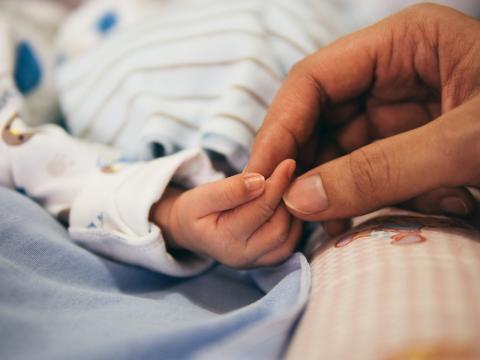
[IMAGE DESCRIPTION: Newborn baby hand with adult hand gently holding it.]
This post was coauthored by Carol Sakala, Director of Childbirth Connection Programs at the National Partnership for Women & Families.
Becoming a mom should be one of the best experiences of our lives. But for too many women who give birth in hospitals, childbirth itself isn’t the joyous event it should be. Instead, it’s fraught with frustration, medical interventions we don’t want or need, and health problems for moms and babies that were avoidable.
A major new survey released today finds a troubling gap between the care women seek in childbirth and the care they actually get – and for women of color, that gap is a chasm. The findings highlight the shameful fact that women of color in particular are not receiving the high-quality, culturally relevant, unbiased care that all women need. That is evident in the unacceptably high maternal mortality and morbidity rates, especially for Black women, that have been widely reported and it is reflected in our findings as well.
The National Partnership for Women & Families led the Listening to Mothers in California project and the California Health Care Foundation and Yellow Chair Foundation funded it. The survey of more than 2,500 women in California found that three in four mothers (74%) say childbirth should not be interfered with unless medically necessary. So far so good. But why, then, did only 5 percent of women give birth without a major medical intervention? Of particular concern:
- The number of C sections is much higher than it should be: One in three women overall, and more than one in four women with low-risk pregnancies, gave birth by c-section.
- We are inducing labor even when it isn’t medically necessary: Four in ten women reported that a health professional tried to induce their labor and more than one third of those women did not identify a medically indicated reason for this procedure.
- Women aren’t getting the access they want to midwives and doulas: Only 9 percent of women had a midwife as their birth attendant and an estimated 9 percent used a labor doula during childbirth, but a majority identified interest in both types of caregivers should they give birth in the future.
- Too many women lack emotional and practical support after giving birth. Latina and Asian Pacific Islander mothers were three to four times more likely than white mothers to report a lack of support.
We recognize that the accumulated experience of racism has detrimental effects on Black women’s health. Previous studies have found that racism is associated with low birth weight and preterm birth. To learn more, we oversampled Black women to better understand their experiences – and the disparities we found were stark. For example, in our survey one in ten Black women reported being treated unfairly during their hospital stay because of their race. The c-section rate was 42 percent for Black women compared to 29 percent for white women. Black women more frequently reported symptoms of anxiety and depression (30% prenatal anxiety compared to 20% for white women; 20% prenatal depression compared to 10% for white women).
We also found alarming undertreatment of depression and anxiety – the most common medical complications of pregnancy and childbirth. Left undetected and untreated, these conditions can lead to negative health outcomes for moms, which can harm the mother-child bond and the child’s long-term physical, emotional and developmental health. In our survey, only one in five women who reported symptoms of anxiety or depression before giving birth got help, and only one in three with symptoms after they had their baby did so.
It’s clear that women are not receiving the kind of care they seek during childbirth. Their message is clear: Give us greater access to proven, high-value forms of care, including midwives, doulas and birth centers – and fewer medical interventions we don’t want or need.
It’s time we start listening to mothers and improve maternity care and policies for women in California and across the country. That means stopping the unwanted, unneeded interventions that make childbirth more difficult and less safe for moms and babies and it means reliably offering proven, effective care that is underused today. The National Partnership joins with MomsRising in supporting measures to make childbirth safer, end disparities and reduce the appalling rate of maternal mortality in our country, such as the Maternal Care Access and Reducing Emergencies (CARE) Act, the Quality Care for Moms and Babies Act, the Maternal Health Accountability Act and others. There’s no time to waste!
Find more survey results and fact sheets, issue briefs, videos, infographic and more at www.nationalpartnership.org/ltmca and www.chcf.org/listening-to-mothers-ca.


The views and opinions expressed in this post are those of the author(s) and do not necessarily reflect those of MomsRising.org.
MomsRising.org strongly encourages our readers to post comments in response to blog posts. We value diversity of opinions and perspectives. Our goals for this space are to be educational, thought-provoking, and respectful. So we actively moderate comments and we reserve the right to edit or remove comments that undermine these goals. Thanks!